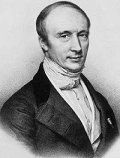Augustin-Louis Cauchy

Augustin-Louis Cauchy (1789-1857, France) was extraordinarily prodigious, prolific and inventive. Home-schooled, he awed famous mathematicians at an early age. In contrast to Gauss and Newton, he was almost over-eager to publish; in his day his fame surpassed that of Gauss and has continued to grow. Cauchy did important work in analysis, algebra and number theory. One of his important contributions was the "theory of substitutions" (permutation group theory). Cauchy's research also included convergence of infinite series, differential equations, determinants, and probability. He invented the calculus of residues. Although he was one of the first great mathematicians to focus on abstract mathematics (another was Euler), he also made important contributions to mathematical physics, e.g. the theory of elasticity. He was the first to prove Fermat's conjecture that every positive integer can be expressed as the sum of k k-gon numbers for any k, and also refined Euler's results in discrete topology. Another of Cauchy's contributions was his insistence on rigorous proofs.
One of the duties of a great mathematician is to nurture his successors, but Cauchy selfishly dropped the ball on both of the two greatest young mathematicians of his day, mislaying the key manuscripts of both Abel and Galois. (For this historical miscontribution perhaps Cauchy should be demoted slightly.)
Source: Wikipedia

